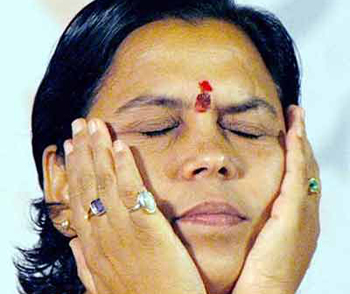New Delhi, Jul 7: The Vyapam cloud darkened over the BJP government in MP on Monday with two more deaths in the state getting linked to the admission and recruitment racket and Union water resources minister Uma Bharati saying she was scared by the spate of mysterious deaths.
 "There is panic in MP due to the deaths. I am scared for the lives of people connected to me. I am a minister but still I am scared. I will convey my fears to CM Shivraj Singh Chouhan," Bharati said on a day when two more persons — woman sub-inspector Anamika Kushwaha, recruited through the MP Professional Examination Board, and police constable Ramakant Pandey, a suspect in the scam — died in suspicious circumstances.
"There is panic in MP due to the deaths. I am scared for the lives of people connected to me. I am a minister but still I am scared. I will convey my fears to CM Shivraj Singh Chouhan," Bharati said on a day when two more persons — woman sub-inspector Anamika Kushwaha, recruited through the MP Professional Examination Board, and police constable Ramakant Pandey, a suspect in the scam — died in suspicious circumstances.
Both were said to have committed suicide. But like in other deaths connected to the scam, the explanation failed to lift the stench of conspiracy. In the case of Kushwaha, who was found in a lake in Sagar, her father refused to cry foul play, but her sister found the death suspicious.
Pandey was found hanging from a ceiling fan at a tourist police outpost in Orchha, Tikamgarh, his place of posting. He had been questioned by the Special Task Force probing the scam a few months ago. Tikamgarh SP Nimish Agarwal said Pandey, an alcoholic, had been depressed because he was saddled with mounting debt.
The two cases came after the spooky deaths of TV journalist Akshay Singh just after talking to the family of Namrata Damor, an alleged beneficiary of the admission racket who was found death near railway tracks three years ago, and Dr Arun Sharma, dean of a medical college in Jabalpur. Sharma was part of the probe into fraudulent admissions in the medical college as part of the fraud.
Uma Bharati, meanwhile, expressed resentment over being included in one of the Vyapam-related FIRs on the basis of the statement of an accused. "It is a very deep conspiracy. The biggest example of the deep conspiracy is that my name is in it. Because I have nothing to do with this. If I am there, then some very serious conspiracy is there," Bharti told PTI.
She acknowledged the overpowering sense of intrigue over the deaths, saying: "Maybe nobody is killing them. But the fear and shame of innocent people are causing brain hemorrhage, heart attack or suicide. When I heard my name in Vyapam, even I went through lot of trauma."
Bharati backed Chouhan in the face of the opposition's shrill demands for his resignation, saying he had a clean image. "I stand with Shivraj ji, I'm concerned about him as he's a sensitive person. He must be upset about these deaths," she said.
But her sympathy for her BJP colleague only underlined the trouble the Vyapam scandal has thrown up for Chouhan when he appeared to be cruising along on the strength of his solid performance as three-term CM of a state which under his tenure grew out of the 'BIMARU' club to take its place among the fast-growing ones.
The day saw BJP spokespersons aggressively rallying around the successful satrap who risks getting stained by the scam but there was a recognition that Chouhan's own credentials may not be sufficient for his defence. With the SIT set to submit its charge-sheet in the scam by July 15, there are fears of the death toll rising because of the likely desperation among the kingpins.
There are indications that the Chouhan government may agree to any suggestion by the Supreme Court to hand over the probe to the CBI -- a demand already made by Congress and others -- in order to control the damage.
Distraught by the timing of the deaths, just when they were nursing their bruises from the controversy over the links of foreign minister Sushma Swaraj and Rajasthan CM Vasundhara Raje, BJP strategists are hoping for a respite, a break from the grim pattern of Vyapam deaths on a daily basis. They are eagerly awaiting the reports of forensic tests into the deaths of Akshay Singh and Dr Sharma, hoping that the findings will rule out foul play.
Although the journalist and the doctor account for only two of a row of people who have died, findings by forensic experts that they were not killed could validate the claim that all Vyapam-linked deaths were not similar and could not be lumped.
Will expose MP CM: Whistleblower
Whistleblower Ashish Chaturvedi said on Monday he would expose MP CM Shivraj Singh Chouhan in the Vyapam scam. Reacting to a warning to him that he would be "cut into pieces", Chaturvedi told NDTV: "Even if I die as a result, I want to name the big fish — starting with Chouhan." TOI had reported on Sunday that Chaturvedi, who had been attacked 14 times, had sought more police protection.





Comments
Add new comment